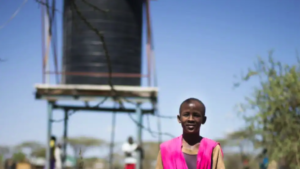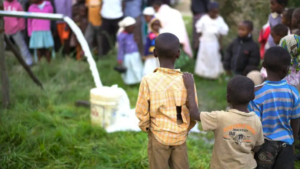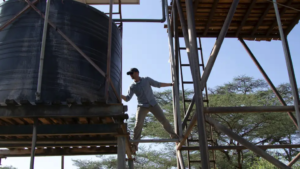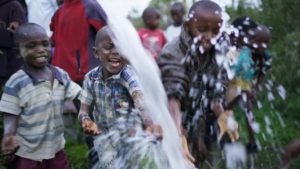In late April 2019, students at two schools in Round Rock, Texas, decided to stop showering for a week. At first, they were excited to disobey one of the cardinal rules of hygiene. But as the week wore on, the students became increasingly tired of being dirty.
By the end of the week, everyone was thrilled for two reasons: they could clean themselves properly again. And they’d raised over $11,000 that would go towards building a well and water system in a water-insecure community in Tanzania.
“When we announced over the school PA that we had made our goal, we heard cheers up and down the hallway,” says Emilee Hinegardner, the International Baccalaureate (IB) teacher who helped organize the strike at Robert P. Hernandez Middle School.
The shower strikes in Round Rock were part of a collaboration with Well Aware, a nonprofit that’s bringing sustainable solutions to water-scarcity and water-contamination in East Africa. The organization tailors its methods to each community so they last for years. The schools learned about Well Aware simply by being near its offices in Austin, Texas.
Water scarcity affects one in three people in Africa, and is getting worse as population and urbanization grow, according to the World Health Organization. Even in areas where rainfall is plentiful, lack of access to clean drinking water leads to parasitic, bacterial and viral infections, which contribute to 115 water scarcity-related deaths an hour across the continent. Building potable water wells and systems in affected areas is one way that philanthropic organizations like Well Aware have been helping combat these harrowing statistics.

Well Aware was founded by Sarah Evans, a lawyer from Texas who learned about water crises in East Africa back in 2006, while she was helping raise funds for a friend’s family’s farm in Kenya. All of the family’s animals were dying, and Evans realized it was because of a lack of potable water. She spent the next four years raising money to help get a successful water well drilled in the village. By 2010, the well was complete, and she saw firsthand how it changed the villager’s lives for the better. She noticed the children especially were overwhelmed with joy to finally have easy access to clean water.

Since then, Well Aware has helped bring clean, sustainable sources of water to over 250,000 people in Kenya and Tanzania. Their secret is simple: they have well-building engineers on staff. Erinn Wright, Well Aware’s Director of Communications says that typical well projects instigated by other nonprofits often fail for two reasons: the team doesn’t have technical engineering expertise, and they don’t involve the local communities in the well-building project. Instead, they regularly hire contractors who use a template formula to drill wells. This can result in faulty wells because the terrain is different in every area.
Well Aware, on the other hand, uses technical experts, who communicate with the community and put its needs first and foremost. “We’re adapting every single water project to that community and that region,” says Wright.
Communities that need clean water also seek out Well Aware with project proposals. Well Aware’s technical team reviews the proposals and decides whether or not a water system is possible given the area’s landscape and environment. If a project is feasible, they send out a team to survey the area. Each project can take as long as a year and a half to complete.

Wells, which are technically called deep submersible boreholes, tend to be the most sustainable way to supply communities with clean water. But a well’s sustainability depends on its recharge rate — the difference between the amount of precipitation that falls and the amount that evaporates, or runs off the land’s surface. Only water that soaks into the ground can refill the well.
Mineral build-up on well screens can also impede pumping water out of the well, as can interference from neighboring wells, says John S. Gierke, Ph.D., P.E., Chair of the Department of Geological and Mining Engineering and Sciences at Michigan Technological University.
A well’s ability to draw water can also decrease if it’s not regularly maintained. “A once-successful well can become unsuccessful if the quality changes,” Gierke says.
One water project can cost anywhere from $10,000 up to $50,000. That’s where fundraising initiatives like Shower Strikes come in. Well Aware fundraises for 80% of its projects. They also help interested parties start their own fundraising campaigns, volunteer their time, and donate while shopping.
Their work would not be possible without generosity from donors, and participation from schools like those in Round Rock, which Well Aware welcomes from any school.
A shower strike is more than a fundraising device, Wright says. It reminds people just how precious water is. “For us, a week without showers is such a frustration,” she says. “But for many communities it’s: ‘What are we going to use to drink?’”
The Round Rock teachers decided to weave the global water crisis into their curriculum. At RPH Middle School, the 6th graders read the novel A Long Walk for Water, which is about children in Africa walking to get water everyday. The 7th graders learned about the science of water from hydrogeologists on the ground in Africa at a current well site via Skype. And the 8th graders designed their own projects aimed at improving their own neighborhoods in any way they can.
The dueling shower strikes in Round Rock raised over $11,000, almost double their initial goal. And the experience made an impression on the students, says Hinegardner.
“I did not know that there was a way for me to contribute to people’s lives on a faraway continent by myself,” she says she heard from one student.
“I finally understood the struggle of others around the world,” said another.
The students also got to see exactly what their efforts have done for the communities in East Africa receiving new water systems.

“It’s incredibly powerful [for the students] to understand that [these people’s] lives will be different,” says Wright. That’s what people in the villages they help often tell Well Aware staff. “They tell us, water is life, so this is going to completely change everything for us.”
